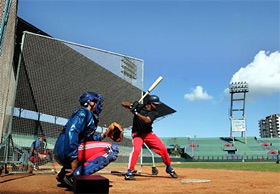 |
 |
 |
 News from Around the Americas | March 2006 News from Around the Americas | March 2006  
Cuba Challenges Big Bucks US Baseball World
 Anthony Boadle - Reuters Anthony Boadle - Reuters


| | Michel Enriquez (R) of Cuba's national baseball team does some batting practice during a team training session in Havana February 17, 2006. Cuba sent its national team on Monday to play in the inaugural World Baseball Classic in a risky bid to challenge the American professional sports world with its Soviet-styled amateur system. (Reuters/Enrique de la Osa) |
Havana - Cuba sent its national team on Monday to play in the inaugural World Baseball Classic in a risky bid to challenge the American professional sports world with its Soviet-styled amateur system.

The Cubans, defending Olympic gold medalists, are among the favorites to top the United States at its own game in the first international baseball tournament to include Major League players.

But defections of poorly-paid players to the Major Leagues - lured by multimillion-dollar U.S. contracts - have hurt Cuba's team and national pride, particularly the 2002 loss of its best pitcher, Jose Contreras.

And more could defect during the 16-nation tournament that began in Tokyo on March 3 and ends in San Diego on March 20, as Major League scouts look for young talent among the Cubans ranks.

President Fidel Castro, dressed in his trademark green military fatigues, gave the Cuban team a two-hour pep-talk on Sunday night and sent them off with the Cuban slogan "Hasta la victoria siempre!" (Always until victory).

Those were the parting words of legendary guerrilla Che Guevara when he set off from Cuba to spread revolution to other countries, only to be captured and killed in Bolivia in 1967.

The Cuban squad, which includes Castro's youngest son Antonio Castro as team doctor, left Monday for Puerto Rico where on Wednesday it will play Panama.

For Castro, not a leader to shy away from risks, the tournament is a chance to poke at his longtime enemy the U.S. government, even if Cuba doesn't win.

The Bush administration, seeking to isolate what it has called "an outpost of tyranny" on its last legs, initially denied the Cubans visas to play in Puerto Rico, a U.S. territory.

But Washington relented under pressure from the baseball world after organizers said the event could fold without Cuba.

REVOLUTIONARY SPORT

Castro's government sees the baseball rivalry with the United States as two-fisted politics by other means.

The president of the Cuban Sports Institute, Christian Jimenez, compared the players with soldiers sent to fight anti-colonial wars in Angola and other parts of Africa.

"We are convinced you will hold up our flag high defending our revolutionary sport with honor and come back like the Cuban soldiers who fulfilled important missions in Africa," Jimenez said at a ceremony.

Cuban baseball fans are worried about how well the team will compete, though. They say their team's Achilles heel is its weak pitching.

Cuba lost star pitcher Contreras when he defected during a tournament in Mexico in 2002. He was signed by the New York Yankees to a $32 million contract, before becoming an important cog in the Chicago White Sox roll to the 2005 World Series championship.

He had been earning just $20 a month in Cuba.

Defections to the United States include pitchers Orlando "El Duque" Hernandez of the World Series champion Chicago White Sox and Hernandez's brother Livan Hernandez, who pitches for the Washington Nationals.

Among the players the scouts will focus on is Cuba's star hitter Yulieski Gourriel. The 21-year-old is the leading slugger in Cuba this season with 17 home runs.

Anti-Castro exiles in Miami have called on the Cuban team to defect, hoping for a repeat of the worst mass defection by 39 athletes and trainers during the Central American and Caribbean Games in Puerto Rico in 1993.

But when it comes baseball, a national passion in Cuba where the sport was introduced by American sailors in the 19th century, most Cubans forget politics.

Even defector Contreras is rooting for Cuba.

"I want Cuba to win. I could never represent any other country," he said last week on U.S. sports network ESPN. "That's my team."

Cuba considers defectors to be traitors, however, and their names disappear from the Cuban media as if they had never existed. Unlike Mexico and the Dominican Republic, Cuba did not allow its Major League players to play for their national team. | 
 | |
 |



